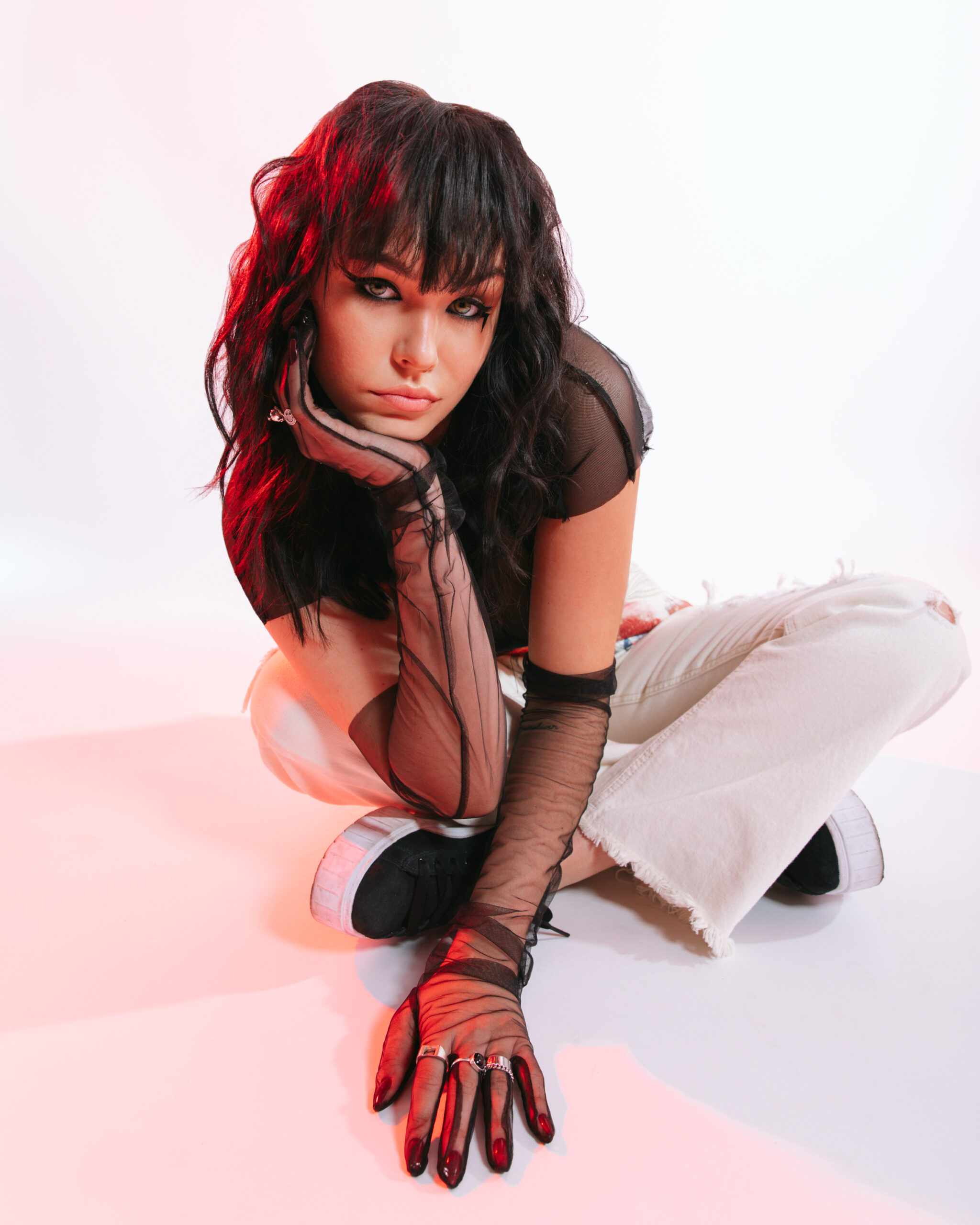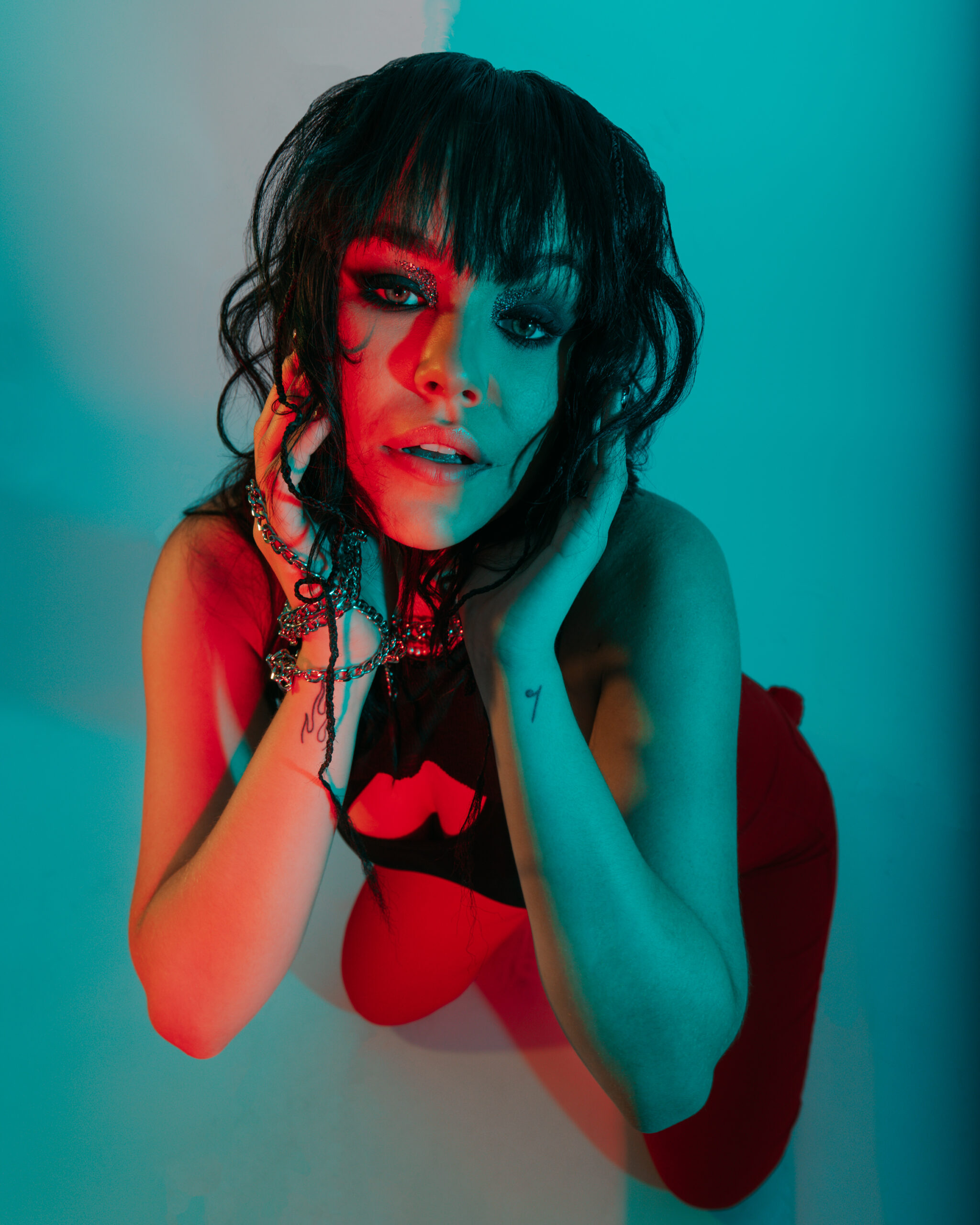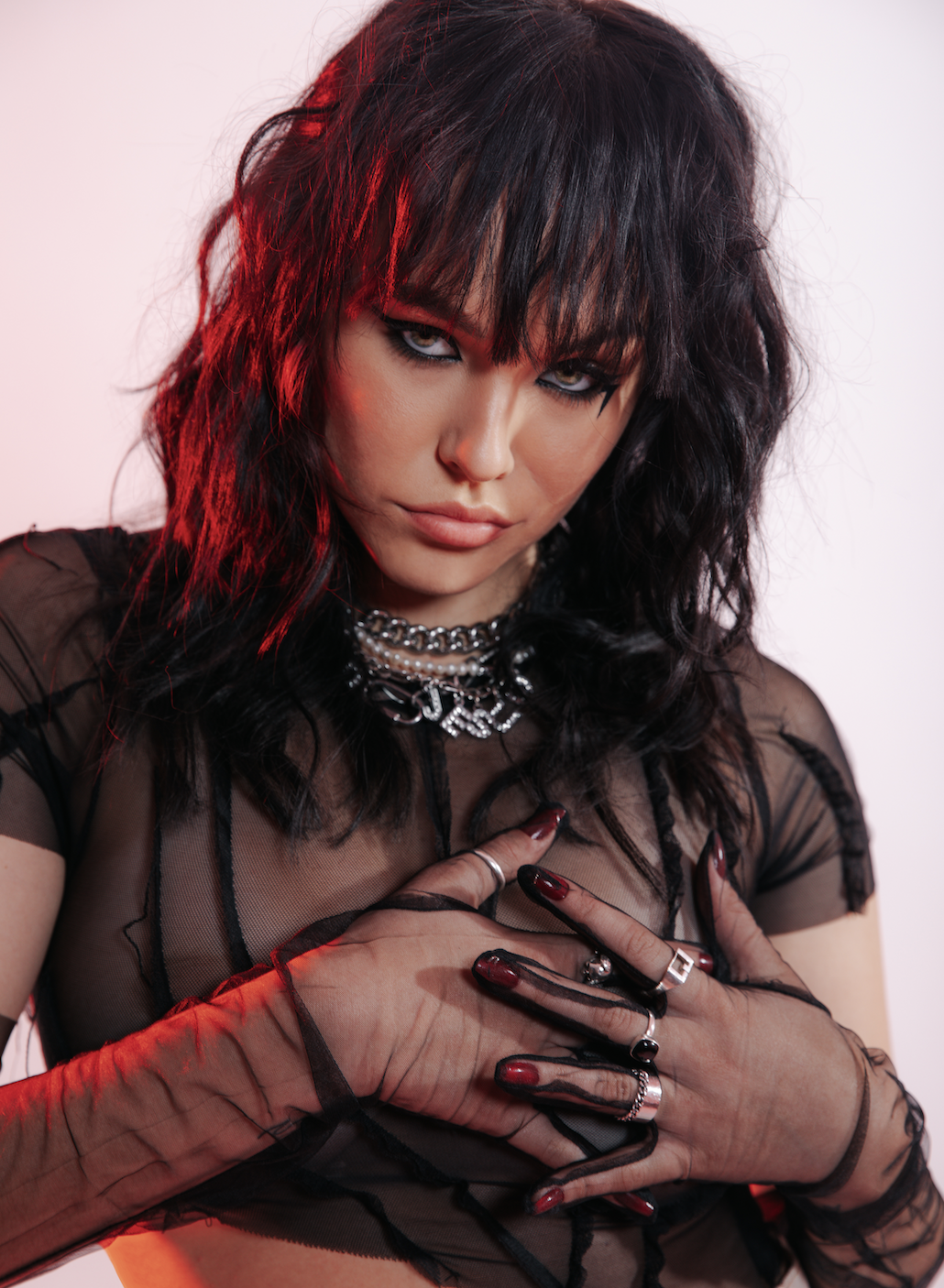For Taylor Upsahl, pursuing anything other than music wasn’t an option. “We had a band room instead of a living room in our house,” she recalls over Zoom on a break from the studio in Los Angeles. Growing up with a dad who performed in punk bands, that was life for the singer known simply as UPSAHL. “There was never really a moment where I was like, ‘Oh, I want to do music.’ There was never another option for me.”
After graduating from high school, the Phoenix native relocated to Los Angeles, where she spent all her time in sessions. It wasn’t long before she landed her first record deal. In 2018, she became the first artist to sign to the reopened Arista Records. What followed were two EPs — 2019’s Hindsight 20/20 and 2020’s Young Life Crisis — as well as a handful of singles.
It took her a minute to get to her debut album, but a major breakup in summer 2020 when she was writing her Young Life Crisis EP prompted the inception of Lady Jesus.
“I was unable to go out and distract myself from being heartbroken,” the 22-year old says. “So I was just doing sessions, writing about the whole thing. It turned from being a breakup album to more of a personal growth, ‘finding yourself’ type album.”

Also Read
UPSAHL DOES A MIXTAPE THING
That growth was empowering for her. The album ended up being a largely uptempo alt-pop record that is an amalgamation of R&B, hip hop, rock and electro-pop. Regardless of genre, it ultimately tells the story in chronological order and takes listeners on the same kind of journey UPSAHL endured to get to Lady Jesus.
Ahead of the release of Lady Jesus, UPSAHL told SPIN about the process of making her new album, who she wants to collaborate with and reinterpreting Psycho for her “Lunatic” music video.

SPIN: How did your debut record come together?
UPSAHL: I started making Lady Jesus in the summer of 2020. I thought, “I’m gonna write a breakup album.” I feel like so many people went through crazy breakups in quarantine, including myself, and I was like, “I’m about to write this ‘sad girl’ album about this breakup.” I started writing the first half of the album in the summer of 2020, and then one day I was in a writing camp with my friends and it hit me. “I think I’m actually okay. I’m over it now. I think I’m actually the best I’ve ever been. I feel like I’ve been rebirthed.” That day, we wrote the title track, “Lady Jesus,” and I decided that day that I wanted the album to be called Lady Jesus.
Tell me about the influences behind the record.
I feel like the record bends a lot of genres and mixes a lot of different influences together. My dad was in punk bands all throughout my childhood, so I grew up listening to a lot of punk music. You can definitely hear that influence on the songs. There’s a lot of live elements: guitar, bass, live drums. But then I was also listening to a bunch of M.I.A., Outkast, Gwen Stefani, No Doubt, so that had a big influence on it.
With the pandemic, how did your songwriting process change?
Because of COVID, my session life became very different, so I was either writing on Zoom or putting together little writing camps with my close-knit group of people that I made the album with. Most of the album was made in different writing camps. We did a camp in this Airbnb in L.A. that was really fun. We made half of the album there, and then we did a camp in the middle of the woods in Nashville, where we made half of the album. I feel lucky that I was able to get in the studio with the people that I made the album with during such a weird time in the world. It forced me to take a step back and be like, “Who do I enjoy making music with?” It became this core group of people.
What are the recurring themes throughout Lady Jesus?
This breakup I went through was the first real heartbreak I’d ever gone through, so I felt feelings that I didn’t even know existed until this past year. Throughout that process, I was in the studio every day writing about however I was feeling that day. So, it covers being angry about the whole situation. In the first song on the album, “Douchebag,” I’m obviously upset, but then on the song “Melatonin,” it’s talking about insomnia, anxiety and depression. Then there’s songs like “Lunatic,” which is about being really angry and living in this fantasy of being a psycho ex. There’s “Notorious” and “Sunny D,” which are very much bad bitch, party, confident, fun songs for me. There’s a song called “IDFWFEELINGS,” which is about giving up on dating in general. It really takes you on this emotional rollercoaster that I went through.

The video for “Lunatic” was inspired by the movie Psycho. How did that visual correspond to the meaning behind the song?
I’ve been working with this director, George Gallardo, for the past year and a half. He’s done all of my music videos with me, so we’re at a point where we both get each other on a creative level. So when he had heard “Lunatic,” he called me and was like, “Have you ever seen the movie Psycho?” and I was like, “Of course. Classic.” He was like, “We should switch the roles and have the woman kill the dude.” It didn’t click in my head that I was going to be literally stabbing, murdering this dude in this video until we were on set doing it. That was a bold choice on George’s part, and I’m so happy that we did it. I wanted to tie “Lunatic” into the world of Lady Jesus as well, so we treated the whole song as this confession that I’m giving in a chapel to bring the entire world of the album together. It also felt very full circle for me and George, specifically, because we were on set for a music video shoot the day my life fell apart and this breakup started. He was there from the beginning until the end with me.
You’ve written songs for artists like Dua Lipa and Mike Shinoda. Do you have a preference in terms of being a singer vs. a songwriter?
I didn’t know that I could be a songwriter for other artists until the Dua Lipa thing happened. I had written this song called “Good In Bed” in a session for myself as an artist. Like most songs, it went into a Dropbox folder to never be seen ever again. And then one day, I got an email that said that Dua had heard it and wanted to finish the song and put it on her album. And I was like, “Dua Lipa, there’s no fucking way. I’ll believe it when it’s out.” Then, that happened, and it kind of opened the door for me to write for other artists. So now I kind of have this nice balance of writing for my own project, and then once I get burnt out on that or I’m just feeling too in my own head, I can write a song for pitch or for another artist. It feels more fulfilling to write for myself, because I do write from a very autobiographical standpoint, but I feel lucky to get to work with other badass women musicians.
Who do you dream of working with in the future?
My dream collaboration will always be Doja Cat. I’m obsessed. I think she’s so badass. Any chance I can get in the studio or in a session with other young dope female artists is really inspiring for me.
Because you went through a breakup before writing the record, were any songs harder to write than others?
All of the songs on the album came very naturally. I feel like all of my best songs, I black out and then it’s like “Wait, we have a song now. How did that happen?” The one we spent the most time on would be “Thriving.” With that one, we had the whole song written, and then at the end of the session, Johnny [Shorr] who produced it and wrote was like, “I think we can do a better chorus.” I remember being so mad. I was like, “Johnny, we just finished the song. Let’s go home.” He was like, “No, we can write a better chorus.” So we sat there and made the chorus what it is now, and I’m so happy that he pushed for it because now the song is sick.
How do you feel like your record is different from your Young Life Crisis EP?
Young Life Crisis was very representative of where I was at during the time I wrote it, I was having a bit of a young life crisis — an existential crisis. Lady Jesus is a very accurate representation of my life now, and the way that it’s different. The tracklisting was put in that order so that you go on this journey in chronological order with me. Sound-wise it bends genre in a way that Young Life Crisis didn’t. It’s basically a screenshot of where I’m at in my life right now.




